Why Regression Testing Is Essential For Continuous Software Updates?
Why Regression Testing Is Essential For Continuous Software Updates?
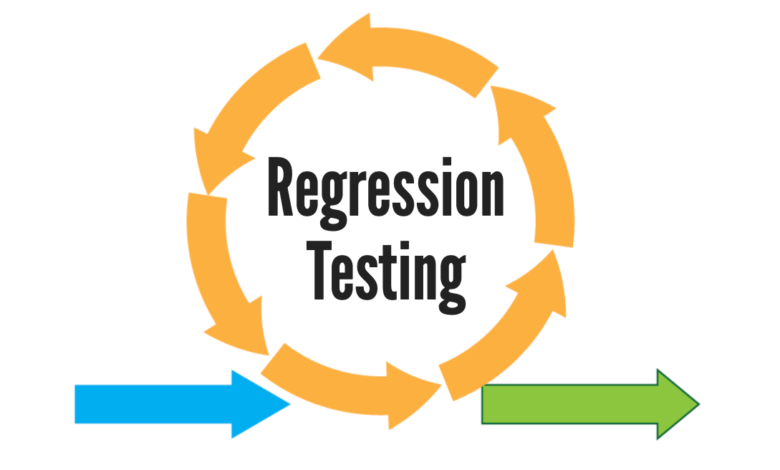
Software applications undergo frequent updates and modifications to meet evolving user demands and technological advancements. With these continuous updates, ensuring the software’s reliability and functionality becomes paramount. Regression testing helps verify that recent code changes have not adversely affected existing functionalities. Enrolling in a Software Testing Course Online can provide valuable insights and skills for professionals looking to delve deeper into this critical aspect of software quality assurance.
Understanding Regression Testing
Regression testing is a software testing practice to confirm that previously developed and tested software still performs after a change. These changes could stem from enhancements, bug fixes, or other modifications. The essence of regression testing lies in its ability to identify any unintended side effects introduced during software updates.
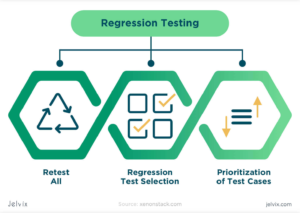
For professionals eager to master the nuances of regression testing, pursuing a Software Testing Certification can further solidify their understanding and credentials in this vital area of software quality assurance. Continuous learning and adaptation are essential in today’s ever-evolving tech landscape, making regression testing not just an option but a necessity for sustainable software development.
The Importance of Regression Testing
- Ensures Stability: Continuous software updates can inadvertently introduce bugs or disrupt existing features. Regression testing helps maintain software stability by ensuring that all functionalities work as intended after any changes are made.
- Improves Quality: By detecting issues early, regression testing enhances the overall quality of the software. Quality assurance (QA) teams can address problems before they reach end-users, thereby improving user satisfaction.
- Facilitates Agile Development: In an agile development environment, where rapid iterations are common, regression testing enables teams to confidently deploy updates. It allows for swift modifications without the fear of breaking existing features.
- Saves Time and Cost: Identifying and fixing issues during the early stages of development is more cost-effective than addressing them after deployment. Regression testing reduces the risk of extensive bug-fixing later in the development cycle.
- Supports Continuous Integration and Delivery (CI/CD): With the growing trend of CI/CD practices, regression testing ensures that automated deployments do not compromise the software’s quality. It provides a safety net for continuous software updates.
Types of Regression Testing
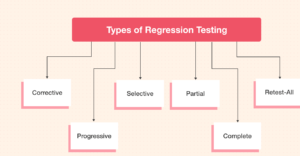
| Type of Regression Testing | Description |
| Unit Regression Testing | Tests individual units of code to ensure they work correctly after changes. |
| Partial Regression Testing | Focuses on specific areas affected by recent changes. |
| Complete Regression Testing | Involves retesting the entire application to verify all functionalities. |
| Selective Regression Testing | Tests only the parts of the application that are relevant to recent changes. |
How to Implement Regression Testing?
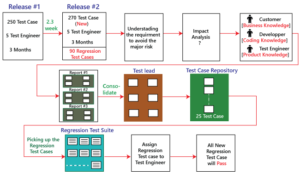
To implement effective regression testing, consider the following steps:
- Define Test Cases: Identify and document test cases that cover all critical functionalities of the application. Ensure these tests are easily repeatable.
- Automate Where Possible: Automation tools can significantly enhance regression testing efficiency. Automated tests can run quickly and frequently, providing immediate feedback on software stability.
- Prioritize Test Cases: Prioritize tests based on the areas most impacted by recent changes, focusing on critical functionalities.
- Integrate with CI/CD Pipeline: Incorporate regression tests into your CI/CD pipeline to ensure that they run automatically after each code change.
- Review and Update Test Cases: Regularly review and update your regression test suite to reflect changes in the application and incorporate new features.
Enhance Your Skills with Courses and Certification
Enrolling in a Software Testing Course Online offers comprehensive training in various testing methodologies, tools, and best practices. These courses are designed to provide flexibility and accessibility, allowing you to learn at your own pace. Coupled with a certification, you can validate your expertise and significantly enhance your career prospects.
Software Testing Certification demonstrates your commitment to quality assurance and your understanding of industry standards. As organizations increasingly prioritize software quality, having a recognized certification can set you apart from the competition.
Whether you are a beginner or an experienced tester, these resources equip you with the skills needed to excel in the rapidly evolving tech industry. By completing an online course and obtaining certification, you position yourself as a valuable asset, ready to tackle the challenges of modern software development and testing.
Regression Testing in Agile Development
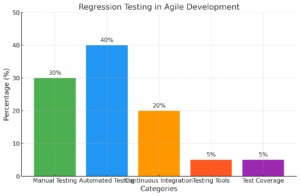
Challenges of Regression Testing in Agile
- Rapid Changes: The fast-paced nature of Agile can lead to frequent changes, making it challenging to keep the regression test suite updated and relevant.
- Resource Constraints: Teams may struggle with limited resources, balancing between developing new features and maintaining existing tests.
- Complex Systems: As systems grow more complex, regression testing can become increasingly challenging. Identifying the impact of changes on interconnected components requires thorough testing strategies.
- Time Limitations: Agile sprints often have tight deadlines, which can restrict the time available for regression testing. Prioritizing test cases becomes essential in these situations.
Conclusion
In conclusion, regression testing is a cornerstone of successful software development, especially in environments that prioritize continuous updates. Its role in ensuring software stability, improving quality, and supporting agile practices cannot be overstated. By investing in regression testing, organizations can streamline their development processes and enhance user satisfaction.




